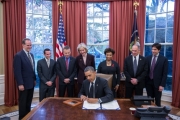Posted on November 22, 2013

BALTIMORE - Johns Hopkins University School of Medicine researchers helped overturn a government ban on transplanting HIV-infected organs.
A bill signed by President Obama on Thursday Nov. 21 reverses the ban on letting HIV-infected people donate their organs for transplantation after death.
Researchers published a scientific paper in 2011 and estimated that 500 HIV-infected patients would be eligible for life-saving transplants each year if the ban was overturned, and allowing those transplants would shorten wait times for non-HIV-infected patients.
The paper was published in the American Journal of Transplantation by Johns Hopkins transplant surgeon Dorry Segev and research assistant Brian Boyarsky.
"For many years, we have been forced to forego perfectly transplantable organs. Now we can give patients with HIV the opportunity to live longer and better lives by transplanting these organs. It will be a profound change," said Segev in a statement.
Congress put the ban into the National Organ Transplant Act of 1984 and it was never updated despite progress in diagnosis and treatment of HIV.
Until now, only South Africa allowed the transplantation of HIV-infected organs into HIV-infected patients.
In the U.S. there are 120,000 people on the waiting list for organs.
Read more: http://www.abc2news.com/dpp/news/health/johns-hopkins-researchers-help-overturn-government-ban#ixzz2lNwh1cOi